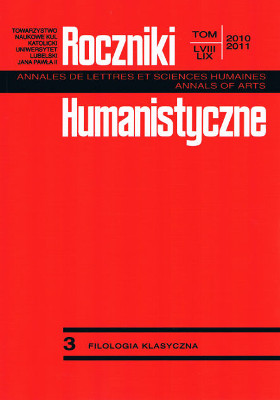Czy De oratore Cycerona może być nazwany dialogiem platońskim?
Abstrakt
This paper seeks to describe the imitation of Platonic dialogues in the aspect of their literary form recognized in Cicero’s De oratore. It requires a presentation of selected polemical interpretations regarding distinct traits of Platonic dialogue as well as taking sides in the matter. The first part of the paper presents G. Zoll’s interpretation of the Platonic dialogue, who in his dissertation on literary form of Ciceronian dialogues labels De oratore the ‘most Platonic’ of his dialogues. In his interpretation, he follows Cicero's way of understanding the features of Plato's masterpieces. Cicero considered the Platonic dialogue to be, first of all, a written tribute paid to the late master by his thankful disciple and, secondly, a text, whose aim is to present a pedagogic situation and to guide its readers. In the second part of the paper an analysis on the double pedagogic situation of De oratore is carried out. In the pedagogic situation presented in the dialogue the role of the master is played by Crassus, while Sulpicius and Cotta are placed on the position of his disciples. This ‘inner’ situation is reflected by the ‘outer’ one, which is evoked on the level of the narrator-author and implied reader. Special attention is paid to various means of building the master’s authority and of enhancing narrator’s importance. The third part of the paper presents briefly opinions of L. Edelstein and P. Plass, who consider Plato’s anonymity to be the most meaningful trait of his works. These commentators stress the presence of aversion towards sophists and speakers of poetical tradition, who usurp the role of the master. This aversion was vividly displayed in many dialogues. According to the mentioned scholars, pedagogy of the Platonic dialogue is different from the ancient model pedagogy, and therefore qualitatively different from Cicero’s pedagogy expressed in De oratore. This confrontation of contagious interpretations of Platonic dialogue facilitates the reevaluation of Cicero’s imitation of Plato’s dialogues.
Bibliografia
Di Lorenzo R., The critique of Socrates in Cicero’s De oratore. Ornatus and the nature of wisdom, „Philosophy and Rhetoric” 11 (1978), s. 247-261.
Edelstein L.: Platonic Anonymity, w: Plato: Critical Assessments. General Issues of Interpretation, red. N.D. Smith, vol. 1, London–New York 1998, s. 183-200.
Frede M.: Plato’s Arguments and the Dialogue Form, w: Plato: Critical Assessments. General Issues of Interpretation, red. N.D. Smith, vol.1, London and New York 1998, s. 253-269.
Görler W.: From Athens to Tusculum. Gleaning the background of Cicero’s De oratore, „Rhetorica” 6 (1988), s. 215-235.
Hall J.: Persuasive Design in Cicero’s De oratore, „Phoenix” 48 (1994), No 3, s. 210-225.
Hirzel R.: Der Dialog. Ein literarhistorischer Versuch, vol. 1, Hildesheim 1963.
Hösle V.: Eine Form der Selbsttranszendierung philosophischer Dialoge bei Cicero und Platon und ihre Bedeutung fűr die Philologie, „Hermes” 132 (2004), Nr 2, s. 152-166.
Jaeger W.: Paideia. Formowanie człowieka greckiego, przeł. M. Plezia i H. Bednarek, Warszawa 2001.
Jones R.E., Cicero’s Accuracy of Characterization in His Dialogues, „American Journal of Philology” 60 (1939), No 3, s. 307-325.
Plass P.: Philosophic Anonymity and Irony in the Platonic Dialogue, w: Plato: Critical Assessments. General Issues of Interpretation, red. N.D. Smith, vol.1, London–New York 1998, s. 201-220.
Press G.A.: The State of the Question in the Study of Plato, w: Plato: Critical Assessments. General Issues of Interpretation, red. N.D. Smith, vol. 1, London–New York 1998, s. 309-332.
Quadlbauer F.: Optimus orator, perfecte eloquens. Zu Ciceros formalem Rednerideal und seiner Nachwirkung, „Rhetorica” 2 (1984), Nr 2, s. 103-119.
Schottländer R.: Die ethische Überordnung der oratorischen über die Rhetorische Redekunst. Zum theoretischen Gehalt von Ciceros De oratore, „Rhetorik” 7 (1988), s. 1-12.
Sławiński J.: Dialog I, w: M. Głowiński, T. Kostkiewiczowa, A. Okopień-Sławińska, J. Sławiński, Słownik terminów literackich, Wrocław–Warszawa–Kraków 1998, s. 98-99.
Stabryła S.: Problemy genologii antycznej, Warszawa–Kraków 1982.
Zoll G.: Cicero Platonis Aemulus. Untersuchung űber die Form von Ciceros Dialogen, besonders von „De oratore”, Zürich 1962.
Copyright (c) 2011 Roczniki Humanistyczne

Utwór dostępny jest na licencji Creative Commons Uznanie autorstwa – Użycie niekomercyjne – Bez utworów zależnych 4.0 Międzynarodowe.





